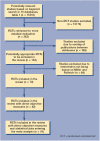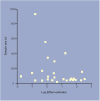Motivational interviewing: a systematic review and meta-analysis
- PMID: 15826439
- PMCID: PMC1463134
Motivational interviewing: a systematic review and meta-analysis
Abstract
Background: Motivational Interviewing is a well-known, scientifically tested method of counselling clients developed by Miller and Rollnick and viewed as a useful intervention strategy in the treatment of lifestyle problems and disease.
Aim: To evaluate the effectiveness of motivational interviewing in different areas of disease and to identify factors shaping outcomes.
Design of study: A systematic review and meta-analysis of randomised controlled trials using motivational interviewing as the intervention.
Method: After selection criteria a systematic literature search in 16 databases produced 72 randomised controlled trials the first of which was published in 1991. A quality assessment was made with a validated scale. A meta-analysis was performed as a generic inverse variance meta-analysis.
Results: Meta-analysis showed a significant effect (95% confidence interval) for motivational interviewing for combined effect estimates for body mass index, total blood cholesterol, systolic blood pressure, blood alcohol concentration and standard ethanol content, while combined effect estimates for cigarettes per day and for HbA(1c) were not significant. Motivational interviewing had a significant and clinically relevant effect in approximately three out of four studies, with an equal effect on physiological (72%) and psychological (75%) diseases. Psychologists and physicians obtained an effect in approximately 80% of the studies, while other healthcare providers obtained an effect in 46% of the studies. When using motivational interviewing in brief encounters of 15 minutes, 64% of the studies showed an effect. More than one encounter with the patient ensures the effectiveness of motivational interviewing.
Conclusion: Motivational interviewing in a scientific setting outperforms traditional advice giving in the treatment of a broad range of behavioural problems and diseases. Large-scale studies are now needed to prove that motivational interviewing can be implemented into daily clinical work in primary and secondary health care.
Figures
References
-
- Miller WR. Motivational interviewing with problem drinkers. Behavioural Psychotherapy. 1983;11:147–172.
-
- Miller WR, Rollnick S. Motivational interviewing, preparing people to change addictive behavior. New York: The Guildford Press; 1991.
-
- Rogers CR. Client-centred therapy. Its current practice, implications, and theory. Boston: Houghton Mifflin; 1951.
-
- Miller WR, Rollnick S. Motivational interviewing, preparing people to change addictive behavior. New York: The Guildford Press; 2002.
-
- Anderson RM, Funnell MM, Butler PM, et al. Patient empowerment. Results of a randomised controlled trial. Diabetes Care. 1995;18:943–949. - PubMed
Publication types
MeSH terms
LinkOut - more resources
Full Text Sources
Medical
Research Materials
Miscellaneous


